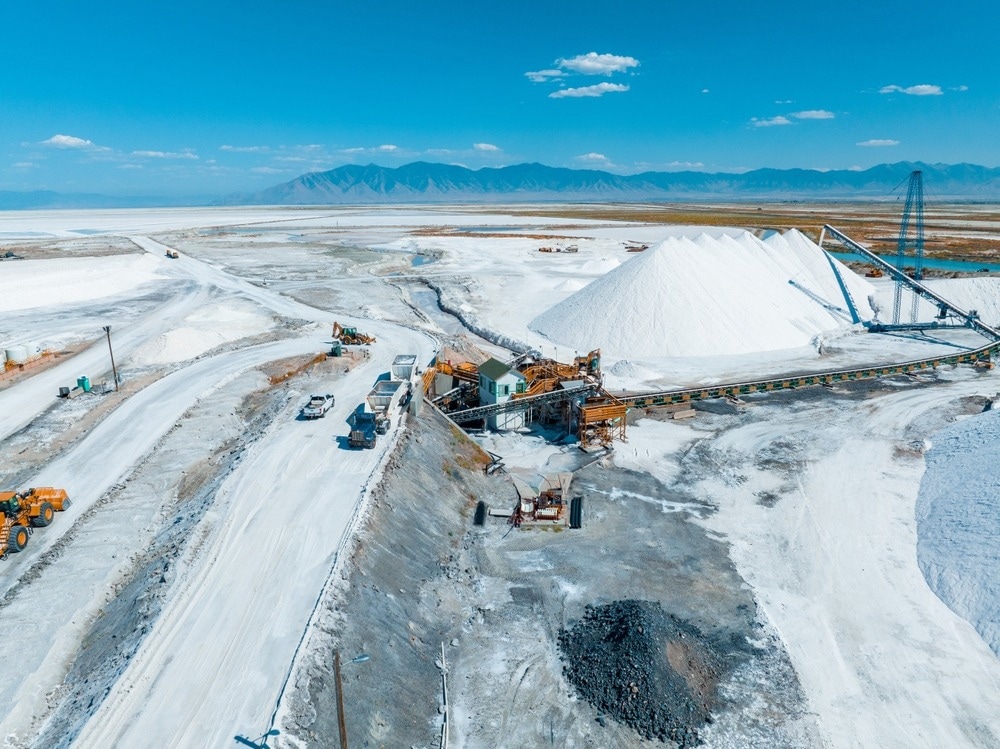The demand for lithium is higher than ever as this valuable mineral is an essential component for batteries that power everything from smartphones to electric vehicles. In addition to meeting ever-rising demand, lithium extraction operations are also under increasing pressure to adopt more sustainable practices.

Image Credit: Pandora Pictures/Shutterstock.com
Demand for lithium is expected to skyrocket as electric vehicles become the norm in the not-too-distant future. Currently, consumer demand is driving the rapid growth of the electric vehicle industry, and manufacturers are accelerating product development. This increases pressure on battery manufacturers, with many scrambling to build massive production facilities. However, as these production facilities come online, they will significantly lack raw materials, particularly lithium.
The good news is that lithium is relatively plentiful. The increased interest in lithium has expanded exploration and extraction operations. According to a US Geological Survey report from 2020, approximately 80 million tons of global lithium reserves have been identified.
One of the biggest challenges right now is bringing lithium to market. Extraction operations are often located thousands of miles away from processing facilities, which are typically located in different countries. This is a logistical and environmental challenge, as the necessary shipping produces large amounts of carbon emissions.
Along the same lines, conventional lithium extraction methods have their own environmental challenges, including high amounts of water use and potential water contamination. Making matters worse, many lithium deposits are located in remote areas where water resources are scarce.
Mining in the Atacama salt flats of Chile is known to divert and contaminate the few water resources in the region. After lithium has been extracted from the salt flats, it is placed into evaporation ponds that concentrate the mineral for processing and shipping. These evaporation ponds require millions of liters of water each day. This enormous water requirement has triggered disputes over water use in countries with large lithium deposits.
Pivoting to More Sustainable Lithium Extraction Methods
Those in the lithium extraction industry are increasingly pivoting toward more sustainable extraction processes because of environmental disputes, corporate responsibility, and expectations of stricter regulation.
Direct Lithium Extraction (DLE) is a more sustainable method using selective absorption technology to eliminate the need for evaporation ponds and other non-sustainable extraction methods.
DLE also conserves water for wildlife, local towns, and any indigenous peoples living nearby, with one company called International Battery Metals claiming its DLE process recycles more than 98% of the water it uses. DLE also eliminates impurities such as magnesium and sulfate from the extraction process.
Another sustainable lithium extraction process gaining popularity is Ekosolve. Based on solvent exchange principles, Ekosolve is a four-stage process to extract lithium from brines drawn from underground aquifers. The result is lithium chloride, to which sodium carbonate is added to yield a batter-grade lithium product.
As with DLE, Ekosolve uses much less water than conventional methods. Because the brines are sent back down to the aquifers from which they were drawn, it significantly reduces any environmental impact.
Putting Sustainable Processes for Lithium Extraction Into Practice
ExxonMobil plans to implement sustainable lithium extraction processes.
In November 2023, ExxonMobil announced plans to drill the first lithium well in Arkansas to extract lithium brine from the Smackover formation in the southern part of the state. The company said this project would produce Mobil-branded lithium for electric vehicle batteries as part of its ongoing relationship with the auto industry.
After extracting the lithium brine using conventional oil and gas drilling methods, ExxonMobil plans to use DLE technology to isolate raw lithium for on-site processing into battery-grade material. The remaining brine will be returned to the aquifer around 10,000 feet behind the surface.
In another project, a startup company called NeoLith Energy is working on a pilot plan in Nevada that will use DLE technology to also process subsurface lithium brine.
A press release from parent company Schlumberger New Energy revealed that the pilot plant represents a step toward an entire lithium production facility. The results of the pilot plant project will inform NeoLith’s efforts to use sustainable practices for lithium extraction to reduce water use by more than 85% compared to conventional methods.
Addressing the Major Challenge for Sustainable Lithium Extraction
Because these projects will involve on-site processing and production of battery-grade material, they will address one of the biggest challenges for making lithium extraction more sustainable: minimizing shipping and logistics.
It currently requires fleets of cargo ships to transport raw materials to battery factories, and batteries to vehicle manufacturers.
The ability to source lithium and refine it at the same location is critical to reducing the overall carbon footprint of the lithium battery supply chain.
Shrinking the supply chain also gives automakers more significant access to lithium batteries as they ramp up their efforts to commercialize electric vehicles.
References and Further Reading
European Commission. (Retrieved 2023 December 14). Development of an innovative and sustainable lithium extraction process from medium lithium grade brines. https://single-market-economy.ec.europa.eu/sectors/raw-materials/eip/raw-materials-commitment/development-innovative-and-sustainable-lithium-extraction-process-medium-lithium-grade-brines_en
ExxonMobil. (2023 November 13). ExxonMobil drilling first lithium well in Arkansas, aims to be a leading supplier for electric vehicles by 2030. https://corporate.exxonmobil.com/news/news-releases/2023/1113_exxonmobil-drilling-first-lithium-well-in-arkansas
Lewis, M. (2022 July 6). What does sustainable lithium mining look like? https://electrek.co/2022/07/06/what-does-sustainable-lithium-mining-look-like/
Disclaimer: The views expressed here are those of the author expressed in their private capacity and do not necessarily represent the views of AZoM.com Limited T/A AZoNetwork the owner and operator of this website. This disclaimer forms part of the Terms and conditions of use of this website.